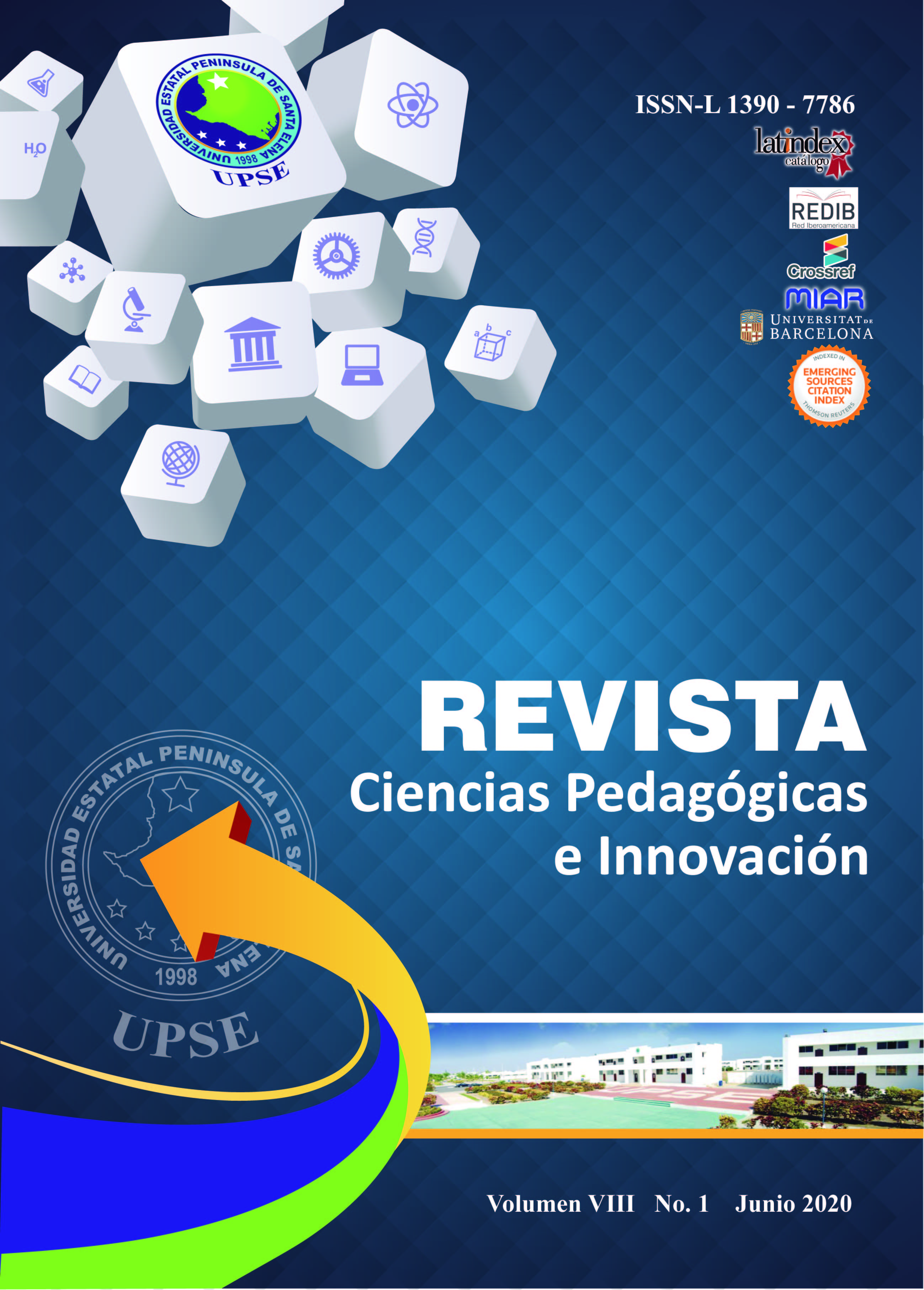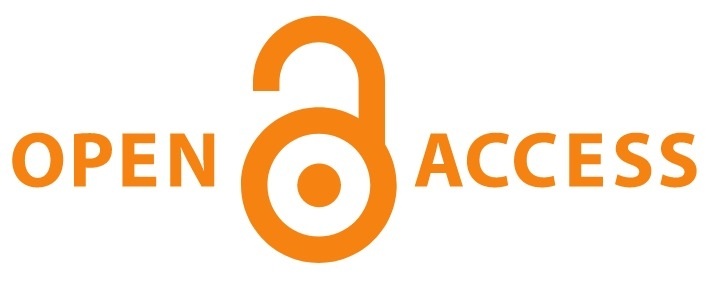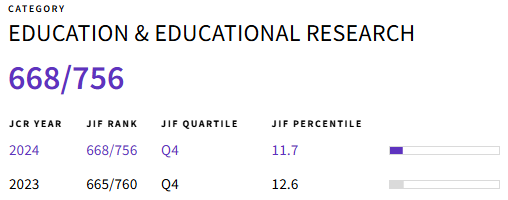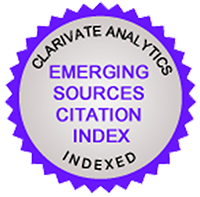ICT in the significant learning of mathematics: Bibliometric study
DOI:
https://doi.org/10.26423/rcpi.v8i1.366Keywords:
ICT, significant learning, mathematics, bibliometric., ICT, significant learning, mathematics, bibliometricAbstract
The purpose of this study is to identify the increase in publications related to ICTs in the significant learning of mathematics. This work covers information and works published in fifteen of the main scientific journals of the ISI Web of Knowledge page from 2014 and 2019, using the keywords: “ICT”, “learning OR knowledge OR study OR studies OR education OR schooling OR learnedness OR wisdom OR enlightenment OR scholarship OR erudition OR instruction OR teaching OR acquisition AND significant” and “mathemat * OR math *”, the information obtained was processed and analyzed in MS - Excel (2016). The study intends to make known about the literature through a bibliometric study about the mentioned topic. The research established that the year of greatest productivity in the research carried out was 2017 with 35 publications, Computers & Education leads the list with 6 publications, also 49 articles were published by more than three authors. On the other hand, Aslan, Aydin; Hutkemri; Costa, Carlos; and Wu, Di were the most publications as author, the number of pages in each publication is from 3 to 35 pages.
Keywords: ICT, significant learning, mathematics, bibliometric.
Downloads
References
C. J. Olelewe and E. E. Agomuo, “Effects of B-learning and F2F learning environments on students’ achievement in QBASIC programming,” Comput. Educ., vol. 103, pp. 76–86, 2016.
O. V. Hermida and B. Casas-Mas, “An empirical review on the effects of ICT on the humanist thinking,” Observatorio, vol. 13, no. 1, pp. 153–171, 2019.
M. Skryabin, J. Zhang, L. Liu, and D. Zhang, “How the ICT development level and usage influence student achievement in reading, mathematics, and science,” Comput. Educ., vol. 85, pp. 49–58, 2015.
UNESCO, “TIC, educación y desarrollo social en América Latina y el Caribe,” pp. 1–30, 2017.
D. V. Enrique, N. F. Ayala, M. J. do R. F. Lima, G. A. Marodin, L. Gzara, and A. G. Frank, “The use of ICT tools to support collaborative product development activities: Evidences from Brazilian industry,” Producao, vol. 28, 2018.
S. Ochoa-Angrino, A. M. Caicedo-Tamayo, J. A. Montes-González, and J. D. Chávez-Vescance, “Competencias y estándares TIC desde la dimensión pedagógica,” COMPETENCIAS Y ESTÁNDARES TIC desde la Dimens. pedagógica, p. 77, 2016.
R. I. Vértiz-Osores, S. Pérez-Saavedra, M. A. Faustino-Sánchez, J. J. Vértiz-Osores, and L. Alain, “Tecnología de la Información y Comunicación en estudiantes del nivel primario en el marco de la educación inclusiva en un Centro de Educación Básica Especial,” Propósitos y Represent., vol. 7, no. 1, p. 146, 2019.
J. Gil-Flores, J. Rodríguez-Santero, and J.-J. Torres-Gordillo, “Factors that explain the use of ICT in secondary-education classrooms: The role of teacher characteristics and school infrastructure,” Comput. Human Behav., vol. 68, pp. 441–449, 2017.
M. del R. Carranza Alcántar, “Enseñanza y aprendizaje significativo en una modalidad mixta: percepciones de docentes y estudiantes / Significant teaching and learning in a blended learning: perceptions of teachers and students,” RIDE Rev. Iberoam. para la Investig. y el Desarro. Educ., vol. 8, no. 15, pp. 898–922, 2018.
C. Alcívar Trejo et al., “El uso de las TIC en el proceso de enseñanza- aprendizaje de los docentes en las Universidades del Ecuador,” 2019.
M. Gui, A. Parma, and S. Comi, “Does Public Investment in ICTs Improve Learning Performance? Evidence From Italy,” Policy and Internet, vol. 10, no. 2, pp. 141–163, 2018.
M. Sánchez-Otero, J. García-Guiliany, E. Steffens-Sanabria, and H. H.- Palma, “Estrategias Pedagógicas en Procesos de Enseñanza y Aprendizaje en la Educación Superior incluyendo Tecnologías de la Información y las Comunicaciones,” Inf. tecnológica, vol. 30, no. 3, pp. 277–286, 2019.
J. Tedesco et al., Las TIC: del aula a la agenda política. Buenos Aires, 2008.
A. Aslan and C. Zhu, “Investigating variables predicting Turkish pre-service teachers’ integration of ICT into teaching practices,” Br. J. Educ. Technol., vol. 48, no. 2, pp. 552–570, 2017.
M. Castellanos, “¿Son las TIC realmente, una herramienta valiosa para fomentar la calidad de la educación?,” terce, vol. 02, pp. 1–9, 2015.
UNESCO, “Educación de calidad en la era digital. Una oportunidad de cooperación para UNESCO en América Latina y el Caribe,” 2011, pp. 1–38.
B. Gorgoretti, “The use of technology in music education in North Cyprus according to student music teachers,” South African J. Educ., vol. 39, no. 1, pp. 1–10, 2019.
A. C. Martínez, “A learning experience with the digital interactives whiteboard in pre-scholar education,” (Nct), pp. 125–136, 2014.
P. Rodriguez, “La Pizarra Digital Interactiva como elemento motivador en la enseñanza de Números Complejos de Matemáticas I de 1o de Bachillerato,” unir Univ. Int. la Rioja, pp. 1–211, 2016.
D. Gallego, M. L. Cacheiro, and J. Dulac, “La pizarra digital interactiva como recurso docente.,” Rev. Electrónica Teoría la Educ. Educ. y Cult. en la Soc. la Inf., vol. 10, no. 2, pp. 127–145, 2009.
M. Campbell, M. Detres, and R. Lucio, “Can a digital whiteboard foster student engagement?” Soc. Work Educ., vol. 38, no. 6, pp. 735–752, 2019.
J. F. Martínez-Cerdá, J. Torrent-Sellens, and I. González-González, “Promoting collaborative skills in online university: comparing effects of games, mixed reality, social media, and other tools for ICT-supported pedagogical practices,” Behav. Inf. Technol., vol. 37, no. 10–11, pp. 1055–1071, 2018.
Y. Ay, E. Karada?, and M. B. Acat, “The Technological Pedagogical Content Knowledge-practical (TPACK-Practical) model: Examination of its validity in the Turkish culture via structural equation modeling,” Comput. Educ., vol. 88, pp. 97–108, 2015.
R. R. Tena, M. P. Gutiérrez, and M. del C. L. Cejudo, “Technology use habits of children under six years of age at home,” Ensaio, vol. 27, no. 103, pp. 340–362, 2019.
A. P. Franky and A. Chiappe, “ICT and home-educating families: a qualitative multiple case study,” Ensaio, vol. 26, no. 101, pp. 1324–1346, 2018.
M. E. Del Moral Pérez, L. V. Martínez, and M. D. R. Neira Piñeiro, “Oportunidades de las TIC para la innovación educativa en las escuelas rurales de Asturias,” Aula Abierta, vol. 42, no. 1, pp. 61–67, 2014.
E. Arbués, S. Ibarrola, and S. Magallón, “Las competencias básicas en la formación inicial del profesorado de primaria. Una metodología transversal desde las didácticas específicas,” Magister, vol. 26, no. 1, pp. 34–42, 2014.
D. Ausubel, “Teoria Del Aprendizaje Significatico,” pp. 1–10, 2008.
E. Núñez, L. Antonia, and R. Zamora, “La generación de ambientes de aprendizaje: un análisis de la percepción juvenil The generation of learning environments: an analysis of the perception of,” RIDE Rev. Iberoam. para la Investig. y el Desarro. Educ., 2017.
E. Pérez Montero and J. B. Ramirez Zarta, “Operations Research: from Strategy to Meaningful Learning,” Tecciencia, vol. 14, no. 26, pp. 8–14, 2019.
J. C. Briede, I. M. Leal, M. L. Mora, and C. S. Pleguezuelos, “Propuesta de modelo para el proceso de enseñanza- aprendizaje colaborativo de la observación en diseño, utilizando la pizarra digital interactiva (PDI),” Form. Univ., vol. 8, no. 3, pp. 15–26, 2015.
E. Rojas-Mancilla, D. Conei, Y. A. Bernal, D. Astudillo, and Y. Contreras, “Learning Histology Through Game-Based Learning Supported by Mobile Technology,” Int. J. Morphol., vol. 37, no. 3, pp. 903–907, 2019.
O. A. Nabor et al., “Uso De Aplicaciones De La Web 2.0 Para La Evaluación Del Aprendizaje Significativo Use of Web 2.0 Applications for the Evaluation of Significant Learning,” Pist. Educ. Tecnológico Nac. México en Celaya Pist. Educ., vol. 40, no. 130, pp. 283–301, 2018.
L. Becerra and M. Mcnulty, “Significant Learning Experiences for English Foreign Language Students,” Profile Issues Teach. Prof. Dev., vol. 12, no. 2, pp. 117–132, 2010.
L. Cadena, F. Montecé, F. Rodríguez, M. Jessica, I. Barcos, and L. Ochoa, “Aprendizaje significativo de la asignatura de administración. Diseño de una guía didáctica.,” Rev. Dilemas Contemp. Educ. Política y Valores, vol. 6, no. 12, pp. 1689–1699, 2019.
M. C. Tumino, E. M. Reyes, and V. E. Flores, “Approaches and Learning Practices in University Students,” J. Educ. Res. Innov. (IJERI), 11, 152-168, pp. 152–168, 2019.
R. Pérez Zúñiga, P. Mercado Lozano, M. Martínez García, E. Mena Hernández, and J. Á. Partida Ibarra, “La sociedad del conocimiento y la sociedad de la información como la piedra angular en la innovación tecnológica educativa / The Knowledge Society and the Information Society as the cornerstone in educational technology innovation,” RIDE Rev. Iberoam. para la Investig. y el Desarro. Educ., vol. 8, no. 16, pp. 847–870, 2018.
R. M. Capilla, “Cuadernos de Investigación Educativa,” Cuad. Investig. Educ., vol. 7, no. 2, pp. 49–62, 2016.
M. Rosa and D. C. Orey, “Ethnomathematics and the responsible subversion of its pedagogical action: an investigation based on three anthropological approaches,” Rev. Bras. Estud. Pedagógicos, vol. 100, no. 254, pp. 191–209, 2019.
R. Cantoral, G. Montiel, and D. Reyes-Gasperini, “El programa socioepistemológico de investigación en Matemática Educativa: El caso de Latinoamérica,” Rev. Latinoam. Investig. en Mat. Educ., vol. 18, no. 1, pp. 5–17, 2015.
D. A. Grouws and K. J. Cebulla, “Mejoramiento del desempeño en matemáticas SERIE PRÁCTICAS EDUCATIVAS - 4 Mejoramiento del desempeño en matemáticas,” 2000.
A. García-Santillán, I. Ortega-Ridaura, and E. Moreno-García, “Actitud Hacia La Matemática Y El Rol De Las Tic En Los Procesos De Enseñanza Aprendizaje. Una Aproximación Para La Definición De Un Modelo Teórico,” Eur. J. Educ. Stud., vol. 1, no. 2, pp. 102–118, 2016.
UNESCO, “Aportes para la enseñanza de la Matemática,” Of. Reg. Educ. la UNESCO, pp. 1–129, 2009.
G. Anthony and M. Walshaw, “Pedagogía eficaz en matemática.,” Bruselas, 2009.
C. S. J. Huang, A. Y. S. Su, S. J. H. Yang, and H. H. Liou, “A collaborative digital pen learning approach to improving students’ learning achievement and motivation in mathematics courses,” Comput. Educ., vol. 107, pp. 31–44, 2017.
R. L. A. Ayala, “INCIDENCIA DE LOS RECURSOS INTERACTIVOS MULTIMEDIA EN EL APRENDIZAJE DE LA ASIGNATURA MATEMÁTICAS,” 2015.
S. Kim, “ICT and the UN’s sustainable development goal for education: Using ICT to boost the math performance of immigrant youths in the US,” Sustain., vol. 10, no. 12, pp. 1–19, 2018.
B. Esguerra-Prieto, N. González-Garzón, and A. Acosta-López, “Herramientas de software matemático para la enseñanza de números complejos,” Rev. Fac. Ing., vol. 27, no. 48, pp. 79–90, 2018.
A. Bosman and S. Schulze, “Learning style preferences and mathematics achievement of secondary school learners,” South African J. Educ., vol. 38, no. 1, pp. 1–8, 2018.
A. H. Bhatti, R. Hasan, A. Al Farsi, and S. I. A. Kazmi, “Dynamic technology tool to support active learning in mathematics,” Proc. - 2017 Int. Symp. Educ. Technol. ISET 2017, pp. 229–233, 2017.
M. M. Visser, A. L. Juan, and S. M. Hannan, “Early learning experiences, school entry skills and later mathematics achievement in South
Africa,” South African J. Child. Educ., vol. 9, no. 1, pp. 1–9, 2019.
A. Bray and B. Tangney, “Technology usage in mathematics education research – A systematic review of recent trends,” Comput. Educ., vol. 114, pp. 255–273, 2017.
K. L. Stoyle and B. J. Morris, “Blogging mathematics: Using technology to support mathematical explanations for learning fractions,” Comput. Educ., vol. 111, pp. 114–127, 2017.
C. V. Prieto, “The Role of ICT for Supporting Relationships between Students. Evidence for Spain,” Procedia - Soc. Behav. Sci., vol. 228, no. June, pp. 123–130, 2016.
P. Gómez, M. C. Cañadas, and M. A. Suavita, “Acquiring the notion of learning hypotheses in mathematics teacher education,” Bolema - Math. Educ. Bull., vol. 32, no. 61, pp. 459–479, 2018.
R. M. Pons, M. R. Bermejo, M. D. Prieto, C. Lomeli, and S. Bulut, “Cooperative learning in mathematics: A study on the effects of the parameter of equality on academic performance,” An. Psicol., vol. 30, no. 3, pp. 832–840, 2014.
P. J. Lin, “The development of students´ mathematical argumentation in a primary classroom,” Educ. Real., vol. 43, no. 3, pp. 1171–1192, 2018.
A. F. Contreras-Colmenares and L. M. Garcés-Díaz, “Ambientes Virtuales de Aprendizaje: dificultades de uso en los estudiantes de cuarto grado de Primaria,” Prospectiva, no. 27, pp. 215–240, 2019.
“Web of Knowledge [v.5.9] - Web of Science Home Thomson Reuters, “No Title,” 2019.
R. Ramírez-Anormaliza, X. Llianás-Audet, and F. Sabaté-Garrido, “Evaluación de los sistemas e-Learning: Estudio de las publicaciones realizadas en la web of Knowledge,” Rev. Cienc. UNEMI, vol. 30, no. 4, pp. 31.
Downloads
Published
Issue
Section
License
El titular de los derechos de autor de la obra, otorga derechos de uso a los lectores mediante la licencia Creative Commons Atribución-NoComercial-CompartirIgual 4.0 Internacional. Esto permite el acceso gratuito inmediato a la obra y permite a cualquier usuario leer, descargar, copiar, distribuir, imprimir, buscar o vincular a los textos completos de los artículos, rastrearlos para su indexación, pasarlos como datos al software o usarlos para cualquier otro propósito legal.
Cuando la obra es aprobada y aceptada para su publicación, los autores conservan los derechos de autor sin restricciones, cediendo únicamente los derechos de reproducción, distribución para su explotación en formato de papel, así como en cualquier otro soporte magnético, óptico y digital.

















